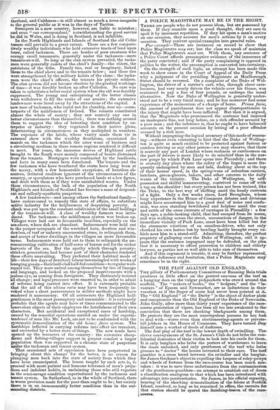A POLICE MAGISTRATE MAY BE IN THE RIGHT.
THERE are people-who do not possess ideas, but are possessed by them. If they stumble upon a good thought, they are sure to spoil it by incessant repetition. If they hit upon a man's motive on one occasion, they account for men's actions by it on every occasion. They convert special examples into general rules. Par exempk—There are instances on record to show that Police Magistrates may err; but the class we speak of maintain that Police Magistrates must err. With them, any sentence of a Police Court affords presumptive evidence of the innocence of the party convicted ; and if the party complaining is opposed in.
politics to the writer, the presumptionis converted into certainty.
On the strength of such logic, an attempt has been made this week to show cause in the Court of Appeal of the Daily Press why a judgment of the presiding Magistrate at Marlborough_ Street should be reversed. On a complaint of the Duke of Wel- lington, the driver of a carrier's cart, who, through sheer care- lessness, had very nearly driven the vehicle over his Grace, was sentenced to pay a fine of four pounds, or undergo the usual alternative. Now the Duke of Wellington is generally under- stood not to be a very timid man ; and he has moreover had some experience of the momentum of a charge of horse. Prima facie, the amount of punishment does not appear disproportionate to the injury that might have been inflicted. But then it is argued,
that the Magistrate who pronounced the sentence had imposed an inadequate fine, not long before, on a rich offender accused by
a poor man ; and the inference is, that he ought to have balanced accounts on the present occasion by letting off a poor offender accused by a rich man. Without impugning the logical accuracy of this mode of reason- ing—without even venturing to hint that the Duke of Welling- ton is quite as much entitled to be protected against furious or careless driving as any other person—we may observe, that there- is scarcely any part of London where rashness or carelessness on the part of drivers is more likely to do mischief than in the nar- row gorge by which Park Lane opens into Piccadilly ; and there- is scarcely any place where the safety of the lieges is more fre- quently endangered by men and lads, dashing about at the top
of their horses' speed, in the spring-vans of °suburban carriers, butchers, green-grocers, bakers, and other caterers to the daily
wants of the vicinity. The Duke of Wellington, by self- possession and skilful manteuvering, contrived to come of with a tap on the shoulder: but every person has not been trained, like
the TDuke, to the best way of shifting amid the heady currents of a .fight. Only a few weeks since, Lord Brougham, whose long experience in the House of Commons debates and divisions might have accustomed him to a good deal of noise and confu- sion, was seen standing bewildered and helpless amid the roar- and rattle of the cross currents of carriages in Piccadilly: a few
days ago, a noble-looking child, that had escaped from its nurse, and was walking across the street, unconscious of danger, in the immediate vicinity of Park Lane, must have been killed but for the strenuous exertions of an omnibus-driver, who not only- checked his own horses but by bawling lustily brought every ve- hicle near him to a stand-still. Admitting, therefore, the perfect
propriety of gallopinc, over the Duke of Wellington, still it ap-. pears that the sentence impugned may be defended, on the plea that it is necessary to afford protection to children and elderly' lawyers, as parties not so well able to take care of themselves.
And if this argument is tenable, it may be further represented, with due deference and hesitation, that a Police Magistrate may sometimes be in the right.


























 Previous page
Previous page